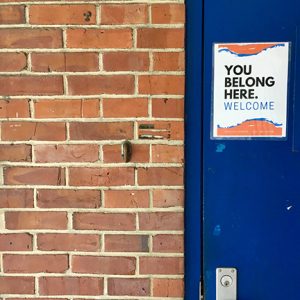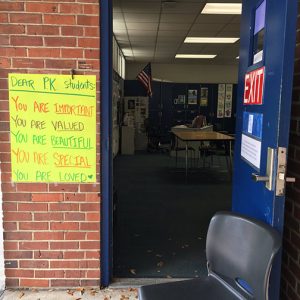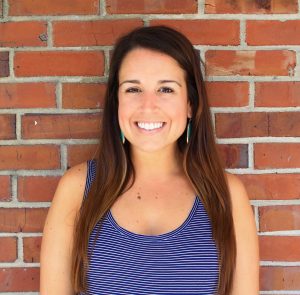This post was written by NCTE member Shelby M. Boehm.
It’s a Tuesday morning, and I’m at a coffee shop hiding from a humid summer shower. I’m visiting my coastal hometown for a few refreshing days at the beach before the school bell rings for my fourth year teaching high school.
I sit down at the last available table, tucked in carefully between a person on a laptop and a group chatting casually. As I begin to turn the page of my book, I become aware that the group at the table to my left is talking about teaching. I almost join in, feeling a sense of belonging and community, kind of like the moment you nod at a fellow teacher in the school supply aisle who is also buying an excessive amount of composition books.
But as group members speak louder, I sink back into my seat, trying to become small as my cheeks get hot.
The conversation is not one of joy or the possibilities of the new school year. I’ll spare you the details because I’m betting you’ve probably heard these conversations before—the kind of venting, usually about students, that hopes for relief once spoken aloud and confirmed by others. I’m not writing to say I’ve never had these conversations or that every day of my teaching career has been the Instagram picture of positivity and #blessed. Yet, this moment in a coffee shop reminded me of the power of perspective and the importance of intentionally adopting a loving attitude towards those around us—namely our students—as we begin a new year.
 I want to be clear: my intent is not to shame distant colleagues for having a candid conversation in what they probably perceived was privacy. However, I cannot continue to call myself a teacher of anti-bias education if I am not willing to speak up against disparaging words that affect students’ identities in our classrooms.
I want to be clear: my intent is not to shame distant colleagues for having a candid conversation in what they probably perceived was privacy. However, I cannot continue to call myself a teacher of anti-bias education if I am not willing to speak up against disparaging words that affect students’ identities in our classrooms.
Words are powerful, and the way we speak about students matters nearly as much as the way we speak to them. Even if students never overhear their teachers in any negative “teacher lounge” talk, I’d be willing to bet that deficit perspectives like those I witnessed ultimately permeate classrooms and school policy decisions such as grading and discipline.
In The Road Less Traveled, M. Scott Peck says, “Love is an act of will—namely, both an intention and an action. Will also implies choice. We do not have to love. We choose to love.”
What would it look like in moments of frustration if we chose to love students for who they are and what they might be in the future?
What if instead of being distant, we showed students that we see and celebrate them as crucial members of our classroom community?
What if instead of beginning the year recalling past negative experiences, we purposefully began with a willingness to be optimistic and show up day after day regardless of what happens?
 This year, I want to choose to love. I want to consider what I hear and to really think about how that impacts my teaching and, ultimately, what my students hear. I want to encourage myself and others to focus on calling up the possibilities within our students.
This year, I want to choose to love. I want to consider what I hear and to really think about how that impacts my teaching and, ultimately, what my students hear. I want to encourage myself and others to focus on calling up the possibilities within our students.
Students will make many choices while at school. What if our classrooms were a refuge for students to seek safety and comfort as they are still learning to make those choices? Even though I’ll spend the remainder of summer critiquing my curricular choices and my first-day-of-school outfit, one thing is certain: every student, both past and present, will know that I love them. I wish the same for your students.

Shelby Boehm teaches tenth-grade English language arts at P. K. Yonge Developmental Research School, the University of Florida’s affiliated K–12 laboratory school. She can be reached at sboehm@pky.ufl.edu or on Twitter @TeamBoehm.

